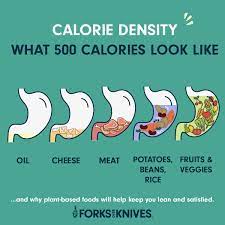Calorie density;
Many diets involve some form of deprivation.
What if there was a way of eating that allowed you to eat as much as you wanted without gaining weight,
and in fact could help you lose weight?
Sounds too good to be true but it is! It’s called a whole food, plant-based diet and the secret lies in calorie density.
Calorie vs. nutrient density

nutrient density
A whole foods-plant based diet is centered around whole or minimally processed vegetables, fruit,
whole grains, and legumes.
These foods are low in calorie density which refers to the number of calories per weight of food.
Without realizing it, we generally tend to eat the same volume of food every day.
By choosing mainly low-calorie dense foods you can eat a larger volume of food,
and feel full, on fewer calories.
This makes it easier to control your weight and even lose weight, all while not going hungry.
The following table shows some common foods and their calories per kilogram.
You can also read my article about The Climate Crisis: Why a plant-based diet will help save the world.
How to Do it
By focussing on the foods at the top of the list, you can literally eat as much as you want and not worry about your weight.
| Food | Calories per kg (kcal/kg) |
| Vegetables | 200 |
| Fruit | 600 |
| Starchy vegetables (e.g.,potatoes, sweet potatoes) | 800 |
| Whole grains, tofu | 1000 |
| Beans, pasta | 1200 |
| Avocado | 1400 |
| Eggs, poultry, fish | 1400 |
| Beef, ice cream | 2000 |
| White bread, dried fruits | 2400 |
| Cheese, sugar | 3400 |
| Processed junk food | 4600 |
| Nuts, seeds | 5600 |
| [DV1] Butters | 6400 |
| Oils | 8000 |
It really is simple math.
Foods that are lower in calorie density take up more space in your stomach,
so you feel fuller on fewer calories, as shown in the image below.
At the same time, foods that are high in calorie density tend to be low in nutrient density meaning they have less
nutrients per weight of food.

Hence the term “empty calories”;
Foods that are high in calories but low in nutrients.
Ultra-processed, convenience foods are typical examples of “empty calories”.
They tend to be high in fat, sugar and salt but don’t contain many vitamins, minerals, fibre, or other nutrients.
When you’re trying to optimize your health and control your weight, every bite counts.
By choosing foods that are nutrient dense, as opposed to calorie dense, you can minimize the calories and maximize the nutrition.
Practical tips
Here are some practical tips to help you make the best foods choices for both your health and your weight.
- Plan your meals according to the following four food groups.
Prepare them with little or no added fat, sugar, and salt.
- Vegetables
- Fruits
- Whole grains
- Beans
- Minimize animal products or better yet eliminate them altogether.
They are high in calories and lack fibre.
Yes, they may contain some beneficial nutrients, such as protein, but this comes packaged with a whole host of other,
less desirable nutrients such as saturated fat and cholesterol.
Swap meat, poultry, and fish for beans
Also, Swap cow’s milk for plant-based milks
And Swap other dairy foods and eggs with other healthy foods (vegetables, fruit, whole grains, and beans).
Be wary of vegan imitation products such as vegan cheeses as these can also be high in calorie density.
Nevertheless, they can be useful when transitioning to a plant-based diet.The best beverage is water and unsweetened tea/coffee.
Try to choose the least processed version of any food, such as whole fruit instead of juice and whole grain breads instead of white bread.
Minimize oils and avoid deep fried foods.
Make fruit the dessert of choice.
Snack on crisp vegetables such as cucumber, carrot and pepper slices rather than processed snacks such as crackers and chips.
Enjoy nuts and seeds sparingly – a little goes a long way!
One serving per day is all you need.
One serving is one quarter of acup of nuts/seeds (60 mL) or 2 tablespoons(30 mL) of nut/seed butter.
Put it into practice
Think about the food choices you make every day and how you can do some easy swaps so that you can get
more nutrition on less calories!
References:
Factsheets produced by the Plant-Based Health Professionals UK
Calorie density
https://plantbasedhealthprofessionals.com/wp-content/uploads/weightmanagement24.03.21.pdf
10 Tips for Weight Management on a Plant-Based Diet
Image reproduced with permission from Forks Over Knives, accessed July 31, 2021 from:


Hi there, I enjoy reading through your post. I wanted to write a little
comment to support you.
Thank You. Best Regards
Yes thank you very much! For more information, I invite you to visit me on Instagram @plantgevity. All the best 🙂